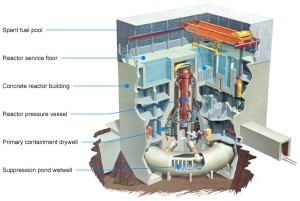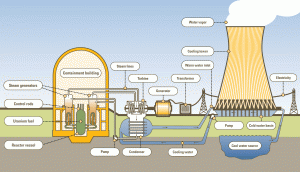Pandora’s Promise is a documentary about the debate of nuclear power directed by Robert Stone. The film’s major argument is that nuclear power is reasonably safe and a clean energy source  which can help alleviate the severe problem of global warming. The documentary features distinguished individuals, some of whom were previously opposed to nuclear power, including Gwyneth Cravens, Stewart Brand, Mark Lynas, Richard Rhodes, and Michael Shellenberger. “Pandora’s Promise” like most documentaries only shows one half of the argument turning it into a propaganda film more than a factual film.
which can help alleviate the severe problem of global warming. The documentary features distinguished individuals, some of whom were previously opposed to nuclear power, including Gwyneth Cravens, Stewart Brand, Mark Lynas, Richard Rhodes, and Michael Shellenberger. “Pandora’s Promise” like most documentaries only shows one half of the argument turning it into a propaganda film more than a factual film.
The documentary starts off explaining peoples constant fears of the word radiation since the atomic bombing in Japan and the scare in Fukushima. And rightfully so people should be scared of nuclear weapons and the massive destruction caused by them but it doesn’t mean they have to be terrified of nuclear power. It is claimed the United States has been buying old nuclear war heads and nuclear material from Japan and Germany to reduce nuclear weapons around the world and eliminate their cause (but one never truly knows). Anyways the next blame for fear of nuclear power is Fukushima, Chernobyl, and Three Mile Island and cancer. Fukushima was a nuclear disaster that occurred when a earthquake hit later causing a tsunami which flooded the emergency generators forcing the plant to run on backup batteries. This eventually caused the  cooling system to stop and caused a meltdown which lead to hydrogen-air explosions. It was later found that 300 metric tons of heavily radioisotope-contaminated water leaked from a storage tank
cooling system to stop and caused a meltdown which lead to hydrogen-air explosions. It was later found that 300 metric tons of heavily radioisotope-contaminated water leaked from a storage tank
on August 20, 2013. Accidents like these are what make people weary of nuclear power and this documentary didn’t focus a lot of safety. It seems to me that if plants are to be built they better be built to withstand hurricanes, tsunamis, earthquakes, and tornadoes or we shouldn’t risk building them. Engineers need to look into a more effective way of housing and building nuclear power plants before I am willing to say yes to their benefits. As well as find a way to keep these plants running when all the electricity goes out.
Nuclear power benefit is that it is considered carbon-free and produces more energy than wind and solar. Nuclear power plants don’t produce smoke so only steam is released into the atmosphere. If no accidents happen and waste is stored properly nuclear power plants are safer than coal plants. There is plenty of uranium and thorium to last us at last 100 years. Nuclear energy facilities have helped create over 15,000 jobs for Americans. Building nuclear plants have a large economic benefit of about $6 billion.
solar. Nuclear power plants don’t produce smoke so only steam is released into the atmosphere. If no accidents happen and waste is stored properly nuclear power plants are safer than coal plants. There is plenty of uranium and thorium to last us at last 100 years. Nuclear energy facilities have helped create over 15,000 jobs for Americans. Building nuclear plants have a large economic benefit of about $6 billion.
Lynas claimed that nuclear waste is “not an environmental issue” even though the U.S. accumulated a football field of nuclear waste. The problem is nuclear waste isn’t easy to get rid of and it can have a half-life longer than 100 years. Our nation doesn’t seem to have a set plan for  the waste and most of it ends up in cooling pools that have in the past leaked into rivers, streams, and the ground. An interesting invention called a dry cask is a 180 ton concrete cylinder that stores waste and is said to withstand a plane crash. While this technology is extremely advanced and preferable to pools where are we going to store them and why aren’t we using the more?
the waste and most of it ends up in cooling pools that have in the past leaked into rivers, streams, and the ground. An interesting invention called a dry cask is a 180 ton concrete cylinder that stores waste and is said to withstand a plane crash. While this technology is extremely advanced and preferable to pools where are we going to store them and why aren’t we using the more?
Discussions about economics of different power sources and the expenses of building a nuclear power plant are not brought up. It turns out nuclear power is too expensive to finance than other low carbon methods. One of the statements in “Pandora’s Promise” was that nuclear power is cheaper than solar or wind power. That statement was true when nuclear power first started but it  isn’t true today. The first generation of nuclear power plants were so costly to build that half were abandoned in construction stages. It was estimated in 2009 that the cost of building a single nuclear power plant costs $9 billion. Analyst shows that new power plants would cost more per kilowatt than wind at 42cents per kilowatt. Even more telling is the Price-Anderson Nuclear Industries Immediate Act which was also never mentioned within the film. It is an act that governs liability related issues for all non-military nuclear reactors. The purpose of the act is to exempt nuclear companies against liable claims from nuclear incidents while ensuring general compensation to the public. It appears the nuclear companies are more than just covering themselves in case of accident, they are covering themselves for when it happens.
isn’t true today. The first generation of nuclear power plants were so costly to build that half were abandoned in construction stages. It was estimated in 2009 that the cost of building a single nuclear power plant costs $9 billion. Analyst shows that new power plants would cost more per kilowatt than wind at 42cents per kilowatt. Even more telling is the Price-Anderson Nuclear Industries Immediate Act which was also never mentioned within the film. It is an act that governs liability related issues for all non-military nuclear reactors. The purpose of the act is to exempt nuclear companies against liable claims from nuclear incidents while ensuring general compensation to the public. It appears the nuclear companies are more than just covering themselves in case of accident, they are covering themselves for when it happens.
I am not against nuclear power or it’s benefits I just think there are questions that need to be answered not avoided and kinks to work out. What happened if a solar flare hits and we lose power or lose power in general? Is there a foolproof containment building that can withstand natural disasters of all kinds? Is there a certain location plants are supposed to be in? Do plants have to be near major sources of water like the ocean? Is there a better way to make an efficient cooling system that can automatically shut down? Is there a way in the future to clean up land once used for a nuclear power plant? Also don’t just think of the human lives lost in nuclear accidents think of the thousands more pets and animals that have died due to human mistakes.
or lose power in general? Is there a foolproof containment building that can withstand natural disasters of all kinds? Is there a certain location plants are supposed to be in? Do plants have to be near major sources of water like the ocean? Is there a better way to make an efficient cooling system that can automatically shut down? Is there a way in the future to clean up land once used for a nuclear power plant? Also don’t just think of the human lives lost in nuclear accidents think of the thousands more pets and animals that have died due to human mistakes.
References:
- http://www.imdb.com/title/tt1992193/
- http://discovermagazine.com/2011/jun/06-hardcore-nuclear-waste-container-airplane-crash
- http://ecowatch.com/2013/11/08/3-claims-pro-nuclear-film-pandoras-promise/
- http://thinkprogress.org/climate/2013/10/06/2717791/cost-pv-cells-solar-power-grid-parity/
- http://www.ucsusa.org/nuclear_power/nuclear-power-and-our-energy-choices/nuclear-power-costs/
- http://en.wikipedia.org/wiki/Pandora’s_Promise

This is excellent article, thank you for the share! This is what I am looking for, hope in future you will continue sharing such an superb work.
Sons Of Anarchy Vest Jax